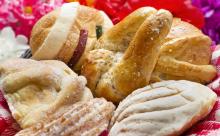manna

THURSDAY NIGHT is baking night at Panadería El Latino on 11th Street. Early Friday morning, the bakers pull their weekend supply of pan dulce from the ovens. Racks and racks of conchas, cuernos, and galletas—in eye-popping yellows and pinks—are set out to cool. The entire street is redolent with yeast, cinnamon, and sugar.
From the outside this bakery looks like any another boarded-up building. “The only indication this isn’t a crack den,” one local points out, “is the overwhelmingly delicious smell of baked goods.” El Latino distributes to corner bodegas across the metro D.C. area. But, if you brave the exterior, you can get three sweet rolls for a buck. Bread of heaven!
Extending our tables to feed the multitudes is a practice Jesus asks us to imitate (Matthew 14:16). When Jesus hosted that feast for “more than 5,000” with “only five loaves and two fish,” it was called a miracle. But the mystery wasn’t in magic math. Rather this is a tale of two parties. In Matthew 14:13-21, the dilemma was that there was too little food and too many people. But in the preceding verses, there was too much food and too little humanity.
Matthew 14:1-12 tells the story of Herod’s birthday party. Here, only the upper 1 percent, the elite and powerful, are gathered in a setting overflowing with the rarest wines, mountains of meat, and the finest breads. But Herodias’ daughter demands a different dish. The main course is served to her on a platter: It is the head of John the Baptist.
THE MOTTO OF RADICAL FAITH always is “now—or never.” If we can’t find divine grace reaching out to us in the here and now, just where we are, then we will never find it. We won’t find it by merely dwelling on the stories and legends of divine interventions in the past. For centuries, the fourth gospel has made people uneasy because it heightens the tension between those who think of religion as loyalty to what has been handed down for us to repeat and those who are prepared to see God right before them and with them now. This month we are asked to immerse ourselves in the very tense sixth chapter of John’s gospel, in which Jesus provokes bafflement and resentment by daring to appropriate to himself the mystique of the manna, the bread from heaven given by God to sustain the Israelites on their journey through the wilderness.
Everyone knew what the bread from heaven was. It was something miraculous embedded in legends of yesteryear, wasn’t it? Quite apart from being scandalized by Jesus’ apparent delusional egomania, the people are unsettled by the way he wrests the whole theme of being fed by God from its safe mummification in legend and miracle, and plants it in the immediate here and now. He forces the question about whether we dare acknowledge our own pangs of hunger for the eternal, and whether we are prepared to receive—eat and drink—the living person of Christ as the gift that will satisfy that hunger.